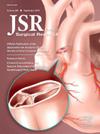Clinical Efficacy of the Indigo Thrombectomy Catheter in Acute Superior Mesenteric Artery Embolism: A Single-center Retrospective Analysis
IF 1.7
3区 医学
Q2 SURGERY
引用次数: 0
Abstract
Introduction
This study aims to evaluate the clinical efficacy and safety of the Indigo thrombectomy catheter in the treatment of acute superior mesenteric artery embolism (SMAE).
Methods
We conducted a single-center retrospective analysis of 15 patients who underwent endovascular thrombectomy using the Indigo Catheter between May 2023 and October 2024. The procedure was performed within 4 h of presentation. Patient baseline characteristics, procedural outcomes, and follow-up data were systematically collected and analyzed.
Results
Technical success, defined as complete thrombus removal, was achieved in all 15 patients (100%). The mean procedure duration was 48 min, and the average hospital stay was 8 d. Three patients exhibited preoperative signs of peritonitis and subsequently underwent laparoscopic exploration immediately after thrombectomy, with two requiring bowel resection due to intestinal necrosis. Additionally, one patient, who initially showed no signs of peritonitis, developed the condition on postoperative day 2 and later required bowel resection. All patients who underwent bowel resection survived. However, one patient succumbed during hospitalization due to severe postoperative embolic complications affecting the lower limb and renal artery, despite intensive management. The median follow-up duration for discharged patients was 6 mo (as of January 2025), with no reported recurrence of SMAE or mortality.
Conclusions
The Indigo thrombectomy catheter demonstrated high technical success rates and favorable clinical outcomes in the treatment of acute superior mesenteric artery embolism (SMAE). Endovascular thrombectomy may serve as a potential first-line intervention for carefully selected SMAE patients without severe peritonitis. Future multicenter studies with larger cohorts are warranted to further validate the safety and efficacy of this percutaneous strategy.
靛蓝取栓导管治疗急性肠系膜上动脉栓塞的临床疗效:单中心回顾性分析
本研究旨在评价靛蓝取栓导管治疗急性肠系膜上动脉栓塞(SMAE)的临床疗效和安全性。方法对2023年5月至2024年10月间采用Indigo导管行血管内取栓术的15例患者进行单中心回顾性分析。手术在就诊后4小时内完成。系统地收集和分析患者的基线特征、手术结果和随访数据。结果所有15例患者(100%)均获得了技术上的成功,即血栓完全清除。平均手术时间为48分钟,平均住院时间为8天。3例患者术前出现腹膜炎症状,取栓后立即行腹腔镜探查,2例患者因肠坏死需要肠切除术。此外,一名患者最初没有腹膜炎的迹象,在术后第2天出现腹膜炎,后来需要肠切除术。所有接受肠切除术的患者均存活。然而,尽管进行了强化治疗,但仍有1例患者在住院期间因严重的术后栓塞并发症影响下肢和肾动脉而死亡。出院患者的中位随访时间为6个月(截至2025年1月),无SMAE复发或死亡报告。结论靛蓝取栓导管治疗急性肠系膜上动脉栓塞(SMAE)技术成功率高,临床效果好。对于精心挑选的无严重腹膜炎的SMAE患者,血管内取栓可作为潜在的一线干预措施。未来的多中心研究需要更大的队列来进一步验证这种经皮策略的安全性和有效性。
本文章由计算机程序翻译,如有差异,请以英文原文为准。
求助全文
约1分钟内获得全文
求助全文
来源期刊
CiteScore
3.90
自引率
4.50%
发文量
627
审稿时长
138 days
期刊介绍:
The Journal of Surgical Research: Clinical and Laboratory Investigation publishes original articles concerned with clinical and laboratory investigations relevant to surgical practice and teaching. The journal emphasizes reports of clinical investigations or fundamental research bearing directly on surgical management that will be of general interest to a broad range of surgeons and surgical researchers. The articles presented need not have been the products of surgeons or of surgical laboratories.
The Journal of Surgical Research also features review articles and special articles relating to educational, research, or social issues of interest to the academic surgical community.

 求助内容:
求助内容: 应助结果提醒方式:
应助结果提醒方式:


